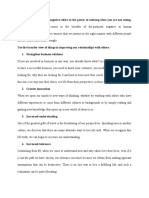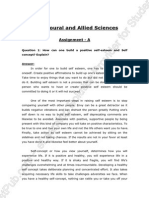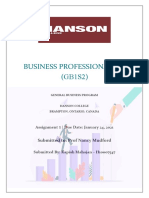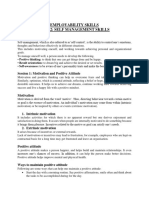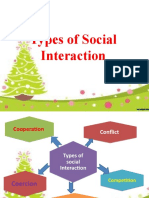The Abcde Model
The Abcde Model
Uploaded by
Puteri Rin Psikoteam MurinaCopyright:
Available Formats
The Abcde Model
The Abcde Model
Uploaded by
Puteri Rin Psikoteam MurinaCopyright
Available Formats
Share this document
Did you find this document useful?
Is this content inappropriate?
Copyright:
Available Formats
The Abcde Model
The Abcde Model
Uploaded by
Puteri Rin Psikoteam MurinaCopyright:
Available Formats
The ABCDE Model Activating Event/Situation: Stage 1 involves a triggering event or situation and acknowledging the negative thoughts
and emotions involved with the event. It is important to look closely at the automatic thoughts those thoughts that have an immediate reaction to an experience. It is helpful to record the thoughts and feelings associated with the event in writing. This stage must be completed before moving on to stage 2. Beliefs:In stage 2 the coach guides the employee to recognize that beliefs trigger negative automatic thoughts. This is significant because thoughts ultimately determine the actions that are taken. Beliefs are formed throughout a persons life, from childhood on, and need to be analyzed in order to change those beliefs that cause negative thoughts and actions. Consequences: This stage involves discussing the internal and external behaviours that followed as a result of an employees beliefs. The internal consequences are those emotions felt inside such as a change in heart rate or stomach butterflies. External consequences are the behaviours exhibited such as yelling at another person or slamming a door when exiting a room. As in all stages, this must be completed before progressing to the next step. Dispute: In stage 4 thoughts and beliefs held are disputed to discern if they are rational or irrational. Should and must beliefs that seem concrete and do not allow flexibility need to be disputed for validity. For example, if a belief that all employees must be nice to each other is held, during this stage it will be disputed to determine if this belief is true. Exchange: In this final stage, beliefs that have been disputed and determined as irrational are exchanged for beliefs that are rational. Replacing negative beliefs that cause negative thoughts is necessary to reframe an employees thinking for the future. Changing beliefs, thought patterns and actions does not occur over night. But once the new, positive beliefs and thoughts have been identified, they can be written down and referenced as often as necessary until they become automatic thoughts. The ABCDE Model of coaching is a great tool that HR managers can use in the workplace to assist developing higher emotional intelligence level in employees. As a result of systematic CBC conferences, employees experiencing instances of low emotional intelligence can be led to have healthy automatic thoughts that will equip them to make wise decisions and produce positive consequences.
You might also like
- The Toronto Empathy QuestionnaireDocument1 pageThe Toronto Empathy QuestionnaireEleena100% (1)
- CoachingDocument42 pagesCoachingManisundaram100% (1)
- Done Bsbldr501 Task 1Document6 pagesDone Bsbldr501 Task 1Gurpreet KaurNo ratings yet
- Bowlby - Psychology and DemocracyDocument16 pagesBowlby - Psychology and DemocracyRodrigo RobertoNo ratings yet
- Emotional Intelligence And Successful Leadership: How to Improve Your Emotional Intelligence to Be the Best Leader With Advanced TechniquesFrom EverandEmotional Intelligence And Successful Leadership: How to Improve Your Emotional Intelligence to Be the Best Leader With Advanced TechniquesRating: 4 out of 5 stars4/5 (1)
- Model PaperDocument33 pagesModel PaperPriyanka NambiarNo ratings yet
- Unit I Personal ChangeDocument65 pagesUnit I Personal ChangeHehe HahaNo ratings yet
- Positive Reinforcement Negative Reinforcement Punishment ExtinctionDocument4 pagesPositive Reinforcement Negative Reinforcement Punishment Extinctionshristi BaglaNo ratings yet
- Assignment 2 - Skill Development Action Plan: Raniya Ali Parappil 45789061 Word CountDocument9 pagesAssignment 2 - Skill Development Action Plan: Raniya Ali Parappil 45789061 Word Countraniya ApNo ratings yet
- Build Emotional Intelligence in Others With The Concept of Critical and Creative ThinkingDocument10 pagesBuild Emotional Intelligence in Others With The Concept of Critical and Creative ThinkingElaina JoyNo ratings yet
- PROJECT C Emotional IntelligenceDocument10 pagesPROJECT C Emotional IntelligenceElaina JoyNo ratings yet
- BSBLDR501Document18 pagesBSBLDR501Shar KhanNo ratings yet
- Organizational Behavior - Practice CaseDocument7 pagesOrganizational Behavior - Practice Caseabir.mahmud.232No ratings yet
- Ei ReportDocument5 pagesEi ReportVenesh Rao Nagesvara RaoNo ratings yet
- Stage 1: Pre-ContemplationDocument4 pagesStage 1: Pre-ContemplationJoseph MayelanoNo ratings yet
- Self Regulation 04Document3 pagesSelf Regulation 04Shahadath Hossain HimelNo ratings yet
- Project Report Role of Emotional Inntelligence in Employee PerformanceDocument26 pagesProject Report Role of Emotional Inntelligence in Employee PerformanceSankalp GahlotNo ratings yet
- Self Management SequenceDocument2 pagesSelf Management SequenceMariz Jane MonamiNo ratings yet
- Journal # 3: Q: What Are The Three Areas You Wish To Develop, Enhance, or Grow?Document3 pagesJournal # 3: Q: What Are The Three Areas You Wish To Develop, Enhance, or Grow?emanNo ratings yet
- Done - Portfolio Activity Unit-2 OBDocument4 pagesDone - Portfolio Activity Unit-2 OBDjahan RanaNo ratings yet
- BUS4402-GRoup ActivityDocument15 pagesBUS4402-GRoup ActivityMarlena PanthierNo ratings yet
- Managing Emotions WorkplaceDocument22 pagesManaging Emotions WorkplaceSAIDNo ratings yet
- JournalsDocument20 pagesJournalsshyamjadeja1992No ratings yet
- RegenratedDocument6 pagesRegenratedMʀ AʜɱɘɗNo ratings yet
- SUMMARIZEDocument2 pagesSUMMARIZEfahadalvi642No ratings yet
- Ally Baker Indigo AssessmentDocument6 pagesAlly Baker Indigo Assessmentapi-726333778No ratings yet
- Behaviour and Allied SciencesDocument16 pagesBehaviour and Allied SciencessinghbabitaNo ratings yet
- Mental Training - Henry StoneDocument35 pagesMental Training - Henry StoneCatalin Finkelstein100% (4)
- QUES1-What Are The Various Stages of Critical Thinking? Which Stage of Critical Thinking You AreDocument7 pagesQUES1-What Are The Various Stages of Critical Thinking? Which Stage of Critical Thinking You AreKunwar Krishna SinghNo ratings yet
- Managerial SkillDocument40 pagesManagerial Skillkkd887553No ratings yet
- Critical Thinking: Beginners guide to advanced critical thinking concepts for problem solving, decision making and goal achievementFrom EverandCritical Thinking: Beginners guide to advanced critical thinking concepts for problem solving, decision making and goal achievementNo ratings yet
- Self-Management SkillsDocument23 pagesSelf-Management SkillsramyashanNo ratings yet
- BSBSTR801 Assessment Task 2Document13 pagesBSBSTR801 Assessment Task 2Habibi AliNo ratings yet
- Chapter-3 - Thoughts Create Emotions and StuffDocument6 pagesChapter-3 - Thoughts Create Emotions and StuffAnthony DyNo ratings yet
- FDSC Supporting Innovation in Health and Social Care Personal and Professional Development, Level 4, 20 Credits Assessment BriefDocument14 pagesFDSC Supporting Innovation in Health and Social Care Personal and Professional Development, Level 4, 20 Credits Assessment BriefleeleelauraNo ratings yet
- Relationship Between OB and The IndividualDocument10 pagesRelationship Between OB and The IndividualAparna SinghNo ratings yet
- Document From Hafsah AnwarDocument29 pagesDocument From Hafsah AnwarHafsah AnwarNo ratings yet
- BSBPEF502 Task 1Document9 pagesBSBPEF502 Task 1Raichal LinaNo ratings yet
- Affirmations PDFDocument31 pagesAffirmations PDFJumaroliNo ratings yet
- R O W G: The GROW ModelDocument4 pagesR O W G: The GROW Modelhrhvdy100% (4)
- The Power Of Positive Attitude - How To Create Success Through A Positive Mental AttitudeFrom EverandThe Power Of Positive Attitude - How To Create Success Through A Positive Mental AttitudeNo ratings yet
- Assignment 1 - Business-ProfessionalismDocument8 pagesAssignment 1 - Business-ProfessionalismKapish MahajanNo ratings yet
- Coaching IntroductionDocument26 pagesCoaching IntroductionsssegganeNo ratings yet
- Unit-2 Self Management SkillsDocument7 pagesUnit-2 Self Management SkillsSanah SayedNo ratings yet
- 26-Action Plans or Merely ComplainsDocument2 pages26-Action Plans or Merely ComplainsQuratulain Altaf HusainNo ratings yet
- Emotional Intelligence - AMMDocument9 pagesEmotional Intelligence - AMMsimon.boatengNo ratings yet
- Basic Counseling Skills: by Rachel C. Reyes-Laureano, PHDDocument59 pagesBasic Counseling Skills: by Rachel C. Reyes-Laureano, PHDMercedita BalgosNo ratings yet
- Emotions, Decisions and DisciplineDocument3 pagesEmotions, Decisions and DisciplineDavid 'Valiant' OnyangoNo ratings yet
- Unit 2Document4 pagesUnit 2elmer riveroNo ratings yet
- Session 13 Counseling Behaviour ChangeDocument33 pagesSession 13 Counseling Behaviour ChangemoshiegonNo ratings yet
- How To Develop Emotional IntelligenceDocument51 pagesHow To Develop Emotional Intelligenceballsinhand100% (1)
- EmotionsDocument28 pagesEmotionsAman KaliaNo ratings yet
- Chapter 4: Values, Attitudes, and Job SatisfactionDocument10 pagesChapter 4: Values, Attitudes, and Job SatisfactionShy CabuenasNo ratings yet
- MRK - FALL 2021 - PSY632 - 1 - MC200200054Document2 pagesMRK - FALL 2021 - PSY632 - 1 - MC200200054Muhamma Ibrahim AbbasiNo ratings yet
- Student Guide-bsbpef502-Chc50121-Cycle A-V2.0 2021Document35 pagesStudent Guide-bsbpef502-Chc50121-Cycle A-V2.0 2021Hanh VoNo ratings yet
- Cognitive CoachingDocument5 pagesCognitive CoachingBhooshan Parikh100% (7)
- Dealing Employees' Emotions and Influence BehaviourDocument3 pagesDealing Employees' Emotions and Influence BehaviourHareen JuniorNo ratings yet
- Transformational LeadershipDocument5 pagesTransformational Leadershipreversible elbisreverNo ratings yet
- AttitudeDocument29 pagesAttitudeparimalamNo ratings yet
- Effective Management CriteriaDocument4 pagesEffective Management CriteriaAnkur SrivastavaNo ratings yet
- Impact of Perceived Social Support On Psychological Wellbeing in Young AdultsDocument7 pagesImpact of Perceived Social Support On Psychological Wellbeing in Young AdultsIJRASETPublicationsNo ratings yet
- Life Coaching: Cetificate CourseDocument8 pagesLife Coaching: Cetificate CourseMina Samir DiefNo ratings yet
- Competency Dictionary FINAL - Updated Oct 2021Document36 pagesCompetency Dictionary FINAL - Updated Oct 2021crakbanvilleNo ratings yet
- The Future of IntrovertsDocument2 pagesThe Future of IntrovertsPrince RomlFGMNo ratings yet
- GenogramDocument12 pagesGenogramMumtaz KhanNo ratings yet
- Understanding Culture Society Politics NotesDocument3 pagesUnderstanding Culture Society Politics NotesJohn Delf GabrielNo ratings yet
- Understanding The Role of UnclesDocument6 pagesUnderstanding The Role of UnclesnelfekihfrNo ratings yet
- Enneagram and Communication StylesDocument5 pagesEnneagram and Communication StylesLax KutyNo ratings yet
- Obando Jan Jeremy P.Document1 pageObando Jan Jeremy P.Jeremy ObandoNo ratings yet
- Domestic Violence: Causes, Effects and Solutions: Student: Vuong Van LongDocument21 pagesDomestic Violence: Causes, Effects and Solutions: Student: Vuong Van LongNgọc Vương Phạm BảoNo ratings yet
- UNIT 5 The Teacher As An Organizational Leader 2Document106 pagesUNIT 5 The Teacher As An Organizational Leader 2May Rhea LopezNo ratings yet
- 10 TH ContingencyDocument23 pages10 TH ContingencyMark Jessie Panopio MagsaysayNo ratings yet
- Men and WomanDocument4 pagesMen and Womanjoaocarlos99No ratings yet
- Data Colected For JournalDocument4 pagesData Colected For JournalVivi Sabrina BaswedanNo ratings yet
- Creating Effective TeamsDocument18 pagesCreating Effective TeamsDAISYBELLE S. BAÑAS100% (1)
- The Importance of Interpersonal Skills: After Studying This Chapter, You Should Be Able ToDocument10 pagesThe Importance of Interpersonal Skills: After Studying This Chapter, You Should Be Able Tokasad jdnfrnasNo ratings yet
- Motivating Employees Under Adverse ConditionDocument7 pagesMotivating Employees Under Adverse ConditionNguyễn Ngọc HươngNo ratings yet
- Types of Social InteractionDocument16 pagesTypes of Social InteractionJunemar JamolinNo ratings yet
- Sportsoziologie DissertationDocument7 pagesSportsoziologie DissertationCheapPaperWritingServiceSalem100% (1)
- Self Compassion and Self HandicappingDocument6 pagesSelf Compassion and Self HandicappingAnnaNedelcuNo ratings yet
- Personal Development Week 7: What I KnowDocument11 pagesPersonal Development Week 7: What I KnowAoi Miyu ShinoNo ratings yet
- Notes Topic 5Document3 pagesNotes Topic 5bubursedap jbNo ratings yet
- HG 11 Diagnostic TestDocument3 pagesHG 11 Diagnostic TestMacky TruzoNo ratings yet
- Culture and SocialisationDocument51 pagesCulture and SocialisationThe PaletteNo ratings yet
- Chapter 3 NSTPDocument15 pagesChapter 3 NSTPAlthea Faye Rabanal100% (2)
- Interpersonal and Conflict Management SkillsDocument34 pagesInterpersonal and Conflict Management SkillsrslapenaNo ratings yet
- Eq Reflection PaperDocument5 pagesEq Reflection Paperapi-582432758No ratings yet
- The Nature of Trust and TrustworthinessDocument3 pagesThe Nature of Trust and TrustworthinessArubaNo ratings yet



















